Our gratitude for Jerry Wallace’s 45 years of service
… for bridging the past to the present
A former Baptist preacher, Jerry M. Wallace was no stranger to the altar. But on Feb. 6, he spoke to a different kind of congregation.
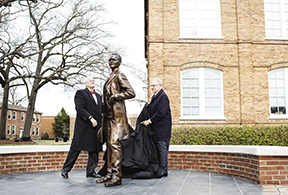 Before him, lining the first five rows of red fabric-covered wooden chairs in scenic Butler Chapel, were the grandchildren, great-grandchildren and great-great-grandchildren of University founder J.A. Campbell, who started Buies Creek Academy in a much less impressive church house in 1887. For the first time in Wallace’s 45-year career at Campbell — a career that began as a professor and eventually administrator and provost before he became the school’s fourth president in 2003 — the Campbell family was gathered in the same place on the same campus that bears their name.
Before him, lining the first five rows of red fabric-covered wooden chairs in scenic Butler Chapel, were the grandchildren, great-grandchildren and great-great-grandchildren of University founder J.A. Campbell, who started Buies Creek Academy in a much less impressive church house in 1887. For the first time in Wallace’s 45-year career at Campbell — a career that began as a professor and eventually administrator and provost before he became the school’s fourth president in 2003 — the Campbell family was gathered in the same place on the same campus that bears their name.
It was an emotional moment for Wallace, who will retire as president this summer at the young age of 80. In an hour, he was going to unveil a 7-foot-tall statue of the founder in front of century-old Kivett Hall, the oldest building on campus. But for this moment, Wallace wanted to pay homage to the difficulties Campbell’s founders overcame to build a school that today educates more North Carolinians than any other private school in the state.
“The Civil War left the South in shambles and defeat, and at the time, there were no public schools left to educate our children,” Wallace said. “Private academies began springing up, but most perished like wilted grass in the noonday heat. Buies Creek Academy survived the odds. Its story is a great story of love, loss, sacrifice and victory.”
Later that evening — after a day that began with an important accreditation meeting for the medical school that bears his name and an even more important Founders Week event with the Campbell family — Wallace reflected more on J.A. Campbell’s dream for his school.
“His dream was to have a school that would help people who otherwise couldn’t afford to get an education,” he said. “I do believe we’re living up to that dream today. Our law school has educated lawyers and sent them to areas of North Carolina that previously didn’t have legal services. The whole premise of the medical school is to educate physicians who’ll locate and serve the underserved parts of our state and nation. And the fact remains that still today, 30 percent of our undergrads are first-generation college students.”

… for envisioning ‘Campbell Proud’
Two years into his term as chair of the Department of Religion and Philosophy, the student newspaper asked Wallace what improvement he thought Campbell needed the most. His answer? “Campbell pride.” The pride, he said, would come by putting “forth our best effort to improve the institution.”
… for carrying the torch
“One of the greatest joys in my life is to have worked with Dr. Norman Wiggins. He was a superb leader, in terms of the quality of a human being, the goodness of a human being and the purity of a human being. When it came time for me to be president, I’d already walked a lot of miles with a very good man. I hope I have carried the torch well. I do believe he would have been pleased with my work.” — Wallace on his predecessor, Norman A. Wiggins
… for the books
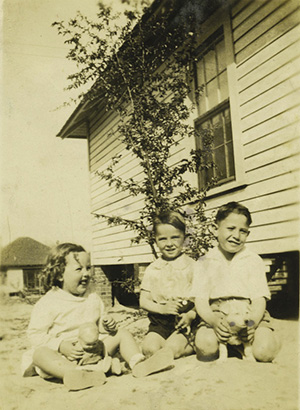 Wallace grew up in a household that had only two books: the Bible and a dictionary. But despite that or perhaps because of that, reading has long been part of Wallace’s daily routine. He has no other hobbies like playing golf or fishing.
Wallace grew up in a household that had only two books: the Bible and a dictionary. But despite that or perhaps because of that, reading has long been part of Wallace’s daily routine. He has no other hobbies like playing golf or fishing.
Other than that Bible or dictionary, the two books that have meant more to Wallace than any others are C.S. Lewis’ “Mere Christianity” and Dale Carnegie’s “How to Win Friends & Influence People.”
He has not only read them many times over; he has given them to others as graduation gifts more than any other items. Why these books? They outline the keys to success, he says. “You need to have vision and work hard. You also need to learn to smile and say thank you, and find something that excites you.”
… for defending dreams
It was freshman orientation, and Erin Overton was lost. Terrified. Overwhelmed.
And so were her parents.
Having a daughter majoring in English standing among a sea of parents whose children were incoming pharmacy majors might have been somewhat unsettling for Erin’s parents, she recalls.
“They always told me, ever since I announced I wanted to be an English major in my junior year of high school, that they were nervous about my entering a ‘less practical’ field,” she says. “I’m sure they were really feeling it on that particular day.”
But it was on this day that President Wallace made a kind gesture that would begin to change her and parents’ perspective forever. Wallace greeted Erin’s father in the lobby before one of the orientation sessions in which he was about to speak.
“Hello, sir. Welcome to Campbell,” Wallace told them with a smile. “I’m President Wallace. What is your student majoring in?”
“English,” Erin’s father replied, with a somewhat ashamed look, she was sure. Erin wasn’t there for this encounter because she was in the student session, but she says she can only imagine how red her father’s face turned.
“English? Wonderful!” Wallce beamed. “That major has served me well.”
And with that, the president went on to greet another parent. Erin is sure her parents were both standing with mouths agape. The president of a college had been an English major?
That was the beginning of a drastic change that took place in Erin’s family toward her decision to follow her dreams and be an English major.
“Although I have never had a personal conversation with President Wallace, I can tell he values the English department,” Overton says. “He must, considering the outstanding education I have received. When I tell my friends at other colleges the trusting relationships I have with my professors, they are awestruck. When I tell them how I have been on the edge of my seat in nearly every course I’ve taken in the English department, they are even more amazed.”
Set to graduate this spring, Erin says her professors have also done an outstanding job over the past four years convincing her of the marketable skills one can receive from a liberal arts degree. She says she has now reached the point where she can make most critics of her choice of major, or at least have them meet her halfway when they argue whether it is practical or not — thanks to her “fantastic professors.”
“President Wallace’s simple comment started it all,” Overton says. “It was a message that this university valued English, even if the whole rest of the world scoffed at it as the most ‘impractical’ major. President Wallace is living proof that it is not impractical. He and Campbell in general, have challenged me to change the world’s negative perception of my beloved major.”
And she’s ready to tell the world when she graduates in May.
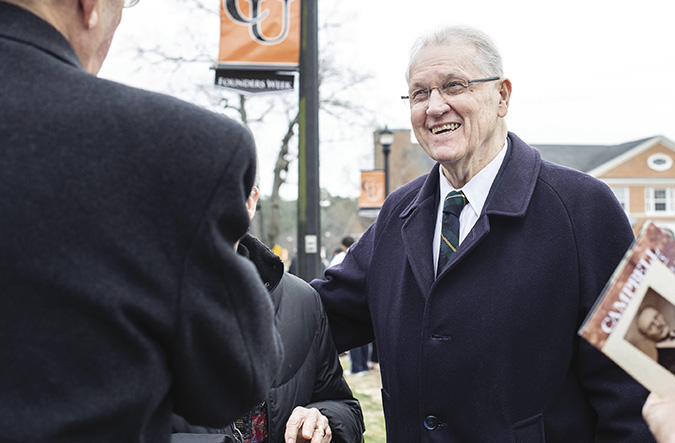
… for seeing it through
Wallace originally planned to step down as president in spring 2014. But the wheels he set in motion over a decade ago prevented him from doing so.
Campus renovation projects like D. Rich Commons and sidewalks on Main Street still needed to be done. Ground still needed to be broken on the new facility that will house Campbell’s new nursing and other health science programs. And most importantly, the accreditation process during the first two years of the medical school needed oversight from the man whose idea launched the school in the first place.
“I felt like I needed to stay another year to see the med school through its first two years of education,” Wallace said. “I want to be as helpful as I can be to have things ready for these students before they go to their clinical sites. It’s been a very, very busy year for the school.”
Wallace will officially hand over the reins as president on July 1, just over two months after his 80th birthday. He will have completed 12 years as president and over 45 years as a professor and administrator at Campbell University. After a year off, he plans to return to Campbell in an honorary chancellor role.
“There are some things I personally want to do with the hope the Lord will give me more bonus years to enjoy,” he said. “But more than all of that, the university is at a stage where it needs new and enthusiastic leadership.
“It’s very unlikely the university will select a 68-year-old person to become president again. But I hope we will look back on my years as president and say it was right for the university. It certainly has been right for me.

… for giving us Betty
When he was a student at East Carolina, Wallace couldn’t afford to buy textbooks for his courses. During the first quarter of his second year, he was in a health class one day when the student sitting behind him told him, “You can use my book.” That student was Betty Blanchard.
Like him, Betty loved sports. (She played basketball in high school all four years.) So for their first date, on Oct. 15, 1953, they went to the freshman football game between East Carolina and N.C. State. Because neither had a car, they courted by walking the streets of Greenville and attending the ball games on campus. Every night, when she got off work from the library, he would walk her back to her dorm. “I trusted him, and I knew he had a strong faith,” Betty says. “He was a good person who was dedicated to doing the right thing.”
To this day, anytime he travels somewhere, he always leaves his wife a hand-written note. “He has never failed to not write me a note,” she says. The most recent: “I ♥ U!”
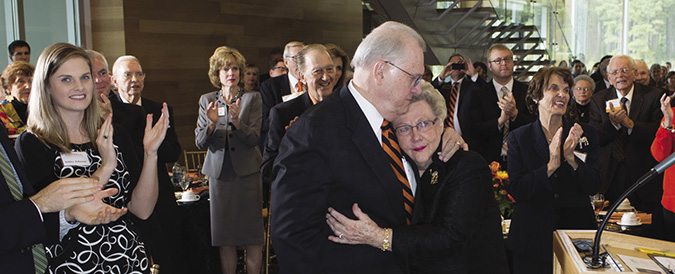
… for your commitment to service
Her first year at East Carolina, Betty Blanchard Wallace took courses in the two-year business degree program. When she started signing up for courses to start her second year, Wallace looked over her schedule. “You’re not going to do this,” he told her.
“Why not?” she asked. “That’s what I came here to do.”
“No, we’re going to change this,” he said.
He had memorized the entire course catalog and revised her schedule. She became a primary and elementary education student. She told him: “You’re going to wind up being an admissions director.”
After they married and once their youngest daughter, Kelly, reached kindergarten, she returned to school and finished her education degree at Campbell in 1972. She went on to teach elementary school for 14 years before joining Campbell as director of the curriculum center and retiring in the 1990s. “I loved it,” she says.
Wallace also encouraged his three children to consider one of four professions: teacher, preacher, lawyer, or doctor. “All serving professions,” his daughter, Betty Lynne Johnson, notes. “He challenged us to serve with the gifts that we have been given.”
Today, his son, McLain, is vice president and general counselor of the Wake Forest Baptist Medical Center; his youngest daughter, Kelly McLamb, teaches as Triton High School; and Betty Lynne Johnson is an associate professor of health professional studies and assistant dean for interprofessional education at Campbell.
… for being a family man
 After Betty gave birth to their oldest child, Betty Lynne, Wallace could hardly believe it. “He didn’t think Betty Lynne was real until she started walking,” his wife, Betty, says.
After Betty gave birth to their oldest child, Betty Lynne, Wallace could hardly believe it. “He didn’t think Betty Lynne was real until she started walking,” his wife, Betty, says.
About eight years after Betty Lynne was born, Betty gave birth to their youngest daughter, Kelly. It was a complicated birth, and things were touch and go for a while. Wallace never left their side. Back home, Betty Lynne and her brother and grandmother were on pins and needles worried about the baby.
About a week later, Wallace stepped into the back door of their home. He stood there, “physically unable to get through the door,” because he was so emotionally spent, Betty Lynne says. He said: “It’s a girl, and they’re OK.” He broke down, weeping and sobbing, relieved.
“His love is so intense; it consumes him,” Betty says. “Between the love that he has for me and his children, it’s unreal.”
“It’s the thing about himself that he can’t control,” his daughter Betty Lynne adds. “He can control most every other thing about himself, but his feelings for us he cannot control. . . . The depth of his feeling stems from his compassion and his capacity to love.”

… for deciding on Campbell (finally)
Shortly after Wallace began teaching at Campbell, President Norman Wiggins asked him to join the faculty full time. Wallace initially accepted the position, signed the contract, and put it in the mail.
But overnight, he couldn’t sleep. He told his wife, “Betty, I did the wrong thing.”
He drove to Campbell the next morning and asked Wiggins’ assistant if the mail had come yet. “Yes,” she said. “I want that letter back,” Wallace said. “I’ve changed my mind. I do not want Dr. Wiggins to have that letter.”
A couple years later, still the pastor of Elizabethtown Baptist, Wallace was on vacation with his wife and children at the beach. Wallace told his assistant, Mrs. Barefoot, he did not want to be interrupted unless someone died. Besides, there was no phone at the place they were staying.
Their second day of vacation, that morning, a police car showed up. The officer told Wallace: “Mrs. Barefoot said it was very important. Dr. Wiggins wants you to call him immediately.” Wallace told his wife: “I’m not going to call him. I know what he wants me to do.”
Betty told him: “You don’t know what he wants. You better call.” He waited until the late afternoon and went to the pier to call Wiggins. Wiggins told him: “Jerry, I want you here in the morning.”
When Wallace told her what Wiggins said, Betty thought: “Lord knows we don’t have any dress clothes down here. How do we get home and get dressed and get the children home and get to Buies Creek?”
But they managed. The next morning, in Buies Creek, Wiggins told Wallace: “Jerry, I want you to take over the religion department.” Wallace had many opportunities to leave Elizabethtown Baptist before, Betty says, but “one of the big reasons he chose not to was because he didn’t feel it was the right time.”
But this time, to be chair of Campbell’s Department of Religion and Philosophy? “He left because he felt that’s what he needed to do,” she says. “We came to Campbell because this is where we were supposed to be. The Lord had a purpose.”
… for saying ‘yes’

Wallace was Campbell’s provost for nearly 20 years — 20 very enjoyable years, he says. But 20 years was enough time, both for him and the university, he thought. So, in 2001, he stepped down from the position and joined the Divinity School faculty. He planned to serve out the remainder of his career there until retiring. Then Norman Wiggins became ill.
Wiggins was in his 37th year of the Campbell presidency. Before him, Leslie Hartwell Campbell was president for 33 years and the founder, J.A. Campbell, for 47. The trustees thought it was best for someone with experience at Campbell to succeed Wiggins as president. They turned to Wallace, then 68 years old. “Jerry had no intentions of becoming president,” says his wife, Betty. “But when Dr. Wiggins died, he thought it was the thing he had to do.”
Wallace accepted the position, with the caveat he serve as president for no more than five years. “I thought five years would be good for me and the university,” Wallace says.
But five years stretched into 12. The reason? Opportunities for Campbell that needed continuity in leadership, he says. “I never envisioned I would be president for 12 years.”
… getting to ‘the point’
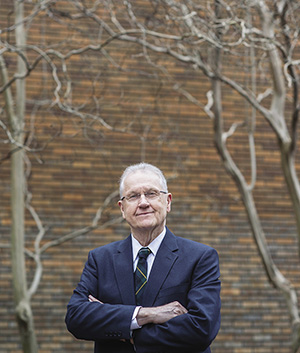
How do you know Wallace is really into your conversation or about to make an important point in a speech? He’ll raise an eyebrow, lift out his right arm and give you “the point,” or as Vice President for Business and Treasurer Jim Roberts calls it, the “big finger.”
Roberts has been on the receiving end of many of them. “He will often say, ‘Well, Jimmy, now you’ve got to remember,’ and it will carry on from there,” Roberts said. “It’s never a bad thing, but you will always get ‘the point’ that no matter what he is talking about, this is where the emphasis lies.”
Often, the point is accompanied by a smile. Other times, it appears to make sure you were listening. “And if you make a statement that is true to the point, you’ll get the big finger,” Roberts said. “If you have never seen it, you have missed a special part of working closely with Dr. Wallace.”
… for launching a pharmacy school
North Carolina didn’t just need more pharmacists in the 1980s; it needed more like the one Norman Wiggins grew up visiting in Burlington. That was a community pharmacist who worked just around the corner from where Wiggins lived and who could address a range of health needs. Wiggins tasked Wallace with making that happen.
As Campbell’s vice president for academic affairs and provost, Wallace oversaw the establishment of the first pharmacy school to open in the U.S. in nearly 40 years. It wasn’t necessarily easy.
When Campbell announced its plans, the news wasn’t welcomed with open arms, particularly by officials at UNC-Chapel Hill, then home to the only pharmacy degree program in North Carolina. They said the state couldn’t support another pharmacy school at a time when their own school had declining enrollment and trouble finding faculty to fill positions.
But Wallace persisted. He traveled the state speaking with elected officials and pharmaceutical leaders to garner support and flood them with the facts. North Carolina needed more pharmacists, especially in rural areas, he said.
He got the public support of key state officials and organizations such as the N.C. Board of Pharmacy and the American Council of Pharmaceutical Education. In August 1986, Campbell welcomed its first pharmacy students, 55 of them. “My proudest achievement thus far is having a major part in the establishment of the School of Pharmacy,” Wallace says. “That might surprise some people, but that is what it is because everything grew out of that.”

… for getting to know your students
If Wallace has to be somewhere across campus, he usually gives himself a five- to 10-minute cushion for the inevitable stops along the way. He has a habit of stopping students to ask them about their day or even their overall Campbell experience.
And students have a habit of stopping him. Wallace’s approachability has been one of his strengths as president. He credits his years as a professor for this gift. “The joy of this place is its students,” he said. “I enjoy teaching and getting to know students. The happiest days of my time at Campbell were spent teaching and interacting with the students.”
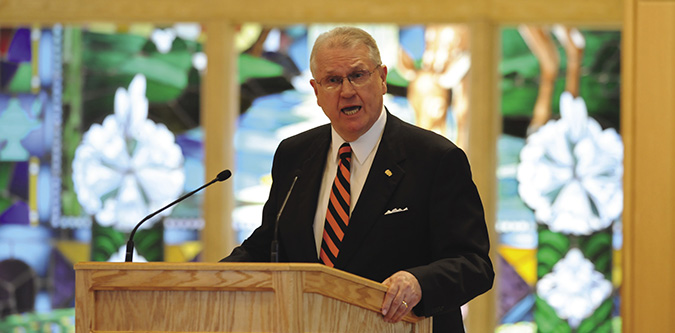
… for still being a Baptist preacher at heart
It has been 45 years since Wallace has served as the pastor of Elizabethtown Baptist, but he stills get called back every now and then to preach or lead a funeral. “He is a preacher first, always will be,” says his wife, Betty. “That is the essence of who he is.”
He started his career as a student preacher at a small Baptist church in Morven, North Carolina, before becoming the senior pastor of Elizabethtown Baptist Church in 1960. Being the pastor of a county-seat Baptist church in the South during the Civil Rights era was a “real challenge,” Wallace says.
But members of the church worked with each other, with community leaders, and with other churches, including African American churches. “The church and I grew together in these painful years,” he says. “We matured together.” The experience also deepened his belief that how to live and act responsibly is best understood and achieved in a religious community, he says.
He thought about pursuing a doctorate in theology, but given his interests, a mentor suggested he study sociology and ethics. Wallace used his days off at Elizabethtown Baptist to take classes at N.C. State University, where he eventually completed his master’s in sociology and doctorate in education. In 1970, he began teaching sociology courses at Campbell as an adjunct.
“At the heart, I am still a Baptist pastor,” Wallace says. “That means I feel what I do at Campbell is a calling and my primary responsibility at Campbell is to do everything I can to please and honor God.”
… for your friendship
When he was a student at East Carolina, Wallace rented out the second floor of a house with eight other boys. One of them was Jim Ellerbe, who grew up with Wallace in Rockingham. Every so often, very early in the morning, Wallace would crawl out his room’s window and sneak into Ellerbe’s room through another window. Wallace would startle him awake. “Jerry was a jokester and a prankster,” Ellerbe says.
Wallace has a little more gray hair than he used to; but “as far as his character and personality and those really important features,” Wallace has changed very little since childhood or college, Ellerbe says. “He’s one of the smartest people I’ve known.”
After retiring as superintendent of the Johnston County Schools, Ellerbe joined the Campbell staff and eventually became the vice president for business. He planned to retire at the same time as President Norman Wiggins. But after being named president, Wallace asked Ellerbe to stay for another year to help during the transition. “I’ll help you out any way I can,” Ellerbe told him.
“When Jerry is your friend,” Ellerbe says, “he is your friend forever.”
… for the ‘evaluator’
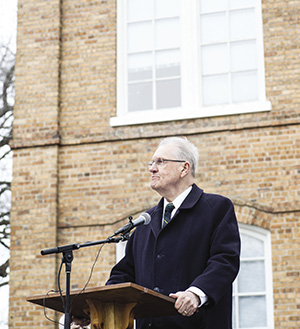
When Wallace was teaching and began a class declaring “This is the day of the Lord,” students knew that was his nice way of saying “It’s Judgment Day,” says Grover Blackburn (1978), a former student of Wallace’s and the current pastor of Angier Baptist Church. Judgment Day meant Wallace was giving “the evaluator,” or what he called his pop quizzes.
“The evaluator was an important part of my methodology of teaching,” Wallace says.
Why the “evaluator”? There are few classroom experiences worse than a prepared teacher standing before an unprepared class. The worst: an unprepared teacher before a prepared class. “That’s unacceptable,” Wallace says. The best: A prepared class and a prepared teacher.
Wallace gave “the evaluator” to motivate his students and his self to be prepared. “If you were prepared, you were OK,” Blackburn says. “If you were not, you had a price to pay.”
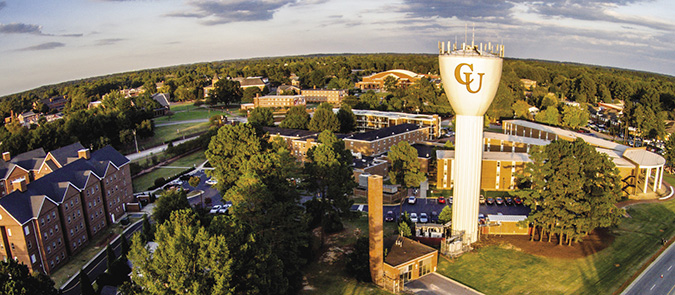
… for making a sacrifice
Growing up the person Wallace most respected was C.B. Deane. Like Wallace, Deane was from Richmond County. A lawyer, he served five successive terms in the U.S. House of representatives from 1946 to 1956, representing North Carolina’s Eighth Congressional District. Once, when Wallace was a student at Richmond County High School, Deane spoke during chapel service.
As Deane spoke, Wallace thought: “If I could be like him and do things like him, that’s what I’d like to do.”
So Wallace enrolled at East Carolina, on a football scholarship, with the intention of being a lawyer. When football practice began, the sport took up all his time. He realized he would probably have an academic major that would not lend itself to being a lawyer. Plus, he met a few other players bigger and better than him. “I saw football was a hard way of life,” he says.
Two weeks into practice, he quit the team. “It was a huge challenge and decision because I was dependent on those resources to provide the money for my education,” says Wallace, who started doing other people’s income taxes to cover tuition.
“It was the hardest thing I had done at that point, but no doubt it was the right thing.”
… for your master plan
On campus infrastructure: “The aim of becoming an even more inviting and attractive campus will guide the improvement, re-arrangement and addition of facilities, resulting in a more defined, useful, safe and enjoyable campus environment for the university community.”
On academic programs: “Campbell will respond to the existing and developing needs of the region, state and nation by providing new undergraduate, graduate and professional programs that complement and extend Campbell’s mission.”
Both of these statements were made in 2003 during Wallace’s inauguration speech — a historic moment in Campbell’s 128-year history where he laid out the foundation of his ambitious master plan. Those quotes made for nice promises and added excitement to his big day, but Wallace has followed through on his plan in his 12 years as president.
His “Time is Now” fundraising campaign launched in 2005 with a goal of $57 million over eight years to fund a new convocation center, residence halls and a chapel. By 2008, that goal tagged $30 million more for a football stadium and the law school’s move to Raleigh.
Today, with the addition of the new facility that will house Campbell’s nursing and other health science programs, the University has spent nearly $250 million for capital projects under Wallace’s tenure. Campbell has launched a medical school, physician assistant program, nursing program, physical and occupational therapy programs, and a homeland security major and will start a school of engineering in 2016.
… being the No. 1 fan

The president’s box at Barker-Lane Stadium is usually full of people on Saturdays in the fall — friends and guests of President Wallace eating, mingling and keeping one eye on the game.
Over the years, they’ve learned that for as conversational and approachable as Wallace is on any other day, he’s quite the opposite on Game Day. An intense competitor as a football player in high school, Wallace is just as intense when he’s watching the Camels on the gridiron.
“You learn to give him some space during intense moments of a game,” said Athletic Director Bob Roller, who learned Wallace was a competitor when he first interviewed for the job in 2011.
“His duties as a president never end, but I’ve learned that he is really concentrating on the next play on the field or court. The highs and lows of a win or loss do not just follow our teams and coaches — you can tell that Dr. Wallace is right there sharing in those emotions.”

… for giving your life to Campbell
During a meeting this past March, Wallace challenged the university executive committee to “Keep Campbell in your hearts.”
“A good leader doesn’t ask his folks to do what he won’t do,” says his daughter, Betty Lynne Johnson.
Wallace has often said “Campbell is worth a life,” and it is he who has given his life for Campbell and its mission, which is Christ’s mission, she adds. The university is always on the forefront of his mind and the tip of his tongue. He hasn’t even taken a real vacation in 45 years. “If you would cut him, he would bleed orange,” Johnson says. “He loves this place with all his heart and soul.”

